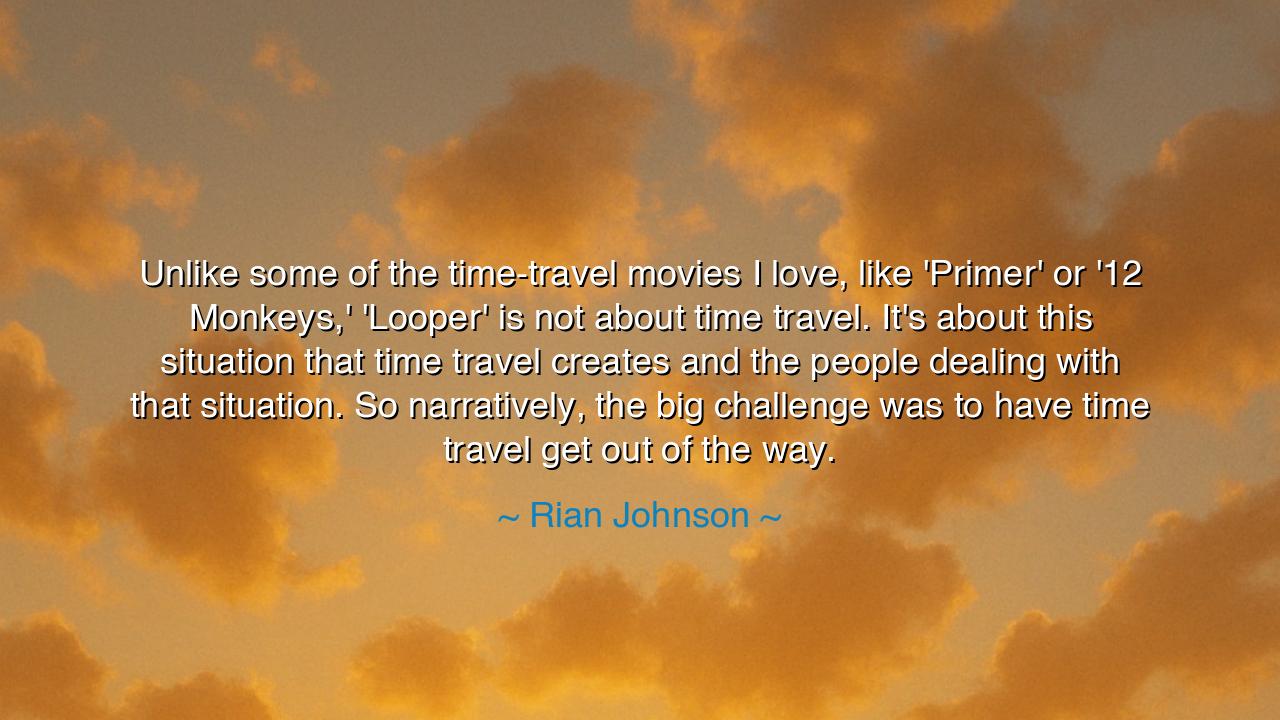
Unlike some of the time-travel movies I love, like 'Primer' or
Unlike some of the time-travel movies I love, like 'Primer' or '12 Monkeys,' 'Looper' is not about time travel. It's about this situation that time travel creates and the people dealing with that situation. So narratively, the big challenge was to have time travel get out of the way.






“Unlike some of the time-travel movies I love, like Primer or 12 Monkeys, Looper is not about time travel. It's about this situation that time travel creates and the people dealing with that situation. So narratively, the big challenge was to have time travel get out of the way.” Thus spoke Rian Johnson, the storyteller, and within his reflection is a truth far older than cinema: that the greatest tales are not about the devices of the plot, but about the souls of the people who move within them. For spectacle may dazzle the eyes, but it is humanity that seizes the heart.
When Johnson says that Looper is not about time travel, he does not deny the presence of that wondrous concept; rather, he reminds us that the mechanism is but a stage. The heart of the story lies not in the machinery of paradoxes or the diagrams of causality, but in the choices of men when confronted with the extraordinary. Just as the ancients used gods, monsters, and miracles as the backdrop for their epics, so modern storytellers use time travel. Yet the true weight lies in the moral struggles, the conflicts of love, loyalty, and sacrifice.
This wisdom is confirmed by the greatest tales of history. Consider Sophocles’ Oedipus Rex: the plague, the prophecy, the curse are the machinery, but the tragedy lives in the choices of Oedipus, in his pride, in his search for truth, in his inability to escape the consequences of his own actions. Or recall Homer’s Odyssey: gods and enchantments fill its pages, yet the enduring power lies in Odysseus’ yearning for home, his resilience, and his growth through suffering. The marvels capture attention, but it is the human struggle that lingers across the centuries.
Johnson speaks too of the challenge: to let time travel “get out of the way.” This is a truth every creator must face—the danger of becoming so enamored with the tools, the spectacle, or the cleverness of craft that the heart of the story is lost. He chose instead the path of restraint: to make the device serve the people, not the people serve the device. This is the discipline of the true artist, who does not worship the brushstrokes, but uses them to reveal the soul within the painting.
The lesson is not confined to art alone. In life as well, the mechanisms—our work, our possessions, our technologies—are not the essence. They are the stage upon which the true drama unfolds: the way we treat others, the values we uphold, the sacrifices we make. Too often, we allow the machinery of life to dominate, forgetting that it is merely a backdrop for the greater play of character and destiny. Johnson’s words remind us: never let the device obscure the human heart.
History gives us a striking parallel in the rise of scientific discovery. When Galileo pointed his telescope to the heavens, the device itself was wondrous, but its purpose was not to glorify the lens—it was to reveal the majesty of the cosmos and man’s place within it. Likewise, when explorers crossed oceans, the ships were grand, but their true legacy was not in the wood and sail, but in the human encounters, the mingling of cultures, the stories of courage and folly that followed. Always it is the human element that endures, while the tools fade into dust.
Thus the teaching is clear: whether in storytelling, in work, or in the journey of life, focus not on the devices, but on the souls who move within them. Use the mechanisms, yes, but let them serve the deeper purpose of revealing truth, virtue, or growth. The marvels of the world are many—time travel, technology, power—but their worth lies only in how they shape the human heart.
So let Rian Johnson’s words echo beyond cinema: do not let the mechanism obscure the meaning. Let the tool be servant, never master. For the true story of life, as in art, is not about the machinery of events, but about the eternal struggles, loves, and choices of the human spirit.






AAdministratorAdministrator
Welcome, honored guests. Please leave a comment, we will respond soon